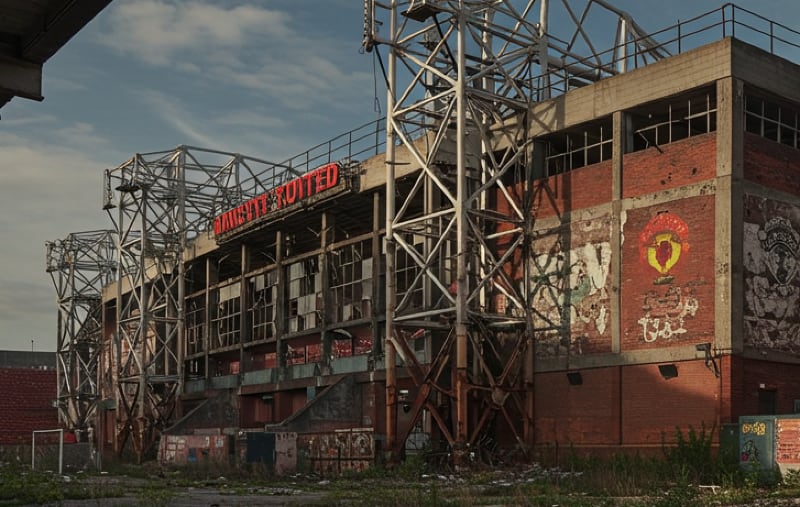
Artist's impression of Old Trafford in 2030
Red Herrings: United's Excuses Can't Hide the Truth
From the relative comfort of the council house, where trophies accumulate like dust on forgotten furniture, one can't help but observe the theatre of dreams meltdown.
From the relative comfort of the council house, where trophies accumulate like dust on forgotten furniture, one couldn't help but observe the theatre of dreams turning into something more resembling a theatre of screams.
Ruben Amorim's post-match soliloquy at Old Trafford, delivered with the gravitas of a Shakespearean actor addressing the groundlings, promised better days ahead for Manchester United. The Portuguese coach, inheriting Erik ten Hag's poisoned chalice, spoke of unity and forward momentum following a rare 2-0 victory over Aston Villa. Noble words, though somewhat undermined by the immediate resumption of anti-Glazer chants before he'd even finished his lap of honour.
The irony wasn't lost on the Noisy Neighbours, where such ownership protests are notably absent – largely because the owners actually know how to run a football club.
While Amorim pleaded for togetherness, the numbers tell a rather different story. The Glazers' leveraged buyout has saddled United with over £1.1 billion in debt, with £738 million paid in interest alone – enough to have built several world-class training facilities or, heaven forbid, actually invested in the playing squad. For perspective, that interest bill could have funded Pep Guardiola's salary for roughly 150 years.
The comedy deepened when discussing transfer plans. Despite needing wholesale changes – evidenced by their 15th-place finish, their worst since narrowly avoiding relegation in 1974 – Amorim was forced to temper expectations due to Financial Fair Play constraints. This from a club that once sneered at City's "financial doping," now discovering that actually managing finances responsibly is rather more challenging than initially anticipated.
Meanwhile, Sir Jim Ratcliffe's grand rescue mission appears to be hitting familiar turbulence. The chemicals magnate, who presumably understands reactions and volatile compounds, might have underestimated the explosive nature of trying to fix United's deep-rooted issues. His Ineos empire, once flying high, now faces challenges across multiple fronts, making Scruffy Jim's £1.2 billion United investment look increasingly like an expensive midlife crisis.
The missed opportunity to qualify for the Champions League via Europa League victory represents more than just sporting disappointment. The estimated £70 million revenue loss – before accounting for knockout progression – means United's summer transfer budget resembles something more appropriate for a Championship promotion hopeful than a club with global aspirations.
Perhaps most telling was Alejandro Garnacho's pointed farewell gesture to the Stretford End, his partner's Instagram post suggesting this was indeed "the last game." When your promising young talents are queuing up to leave, it rather undermines the "bright future" narrative.
From the Etihad, where European nights are routine rather than desperate prayers, United's plight serves as a masterclass in how not to run a modern football club. While City methodically collect trophies like a particularly efficient stamp collector, their neighbours continue to collect excuses.
The contrast couldn't be starker: one club built for sustained success through strategic planning and investment, the other lurching from crisis to crisis while servicing astronomical debt payments. As United fans sing about wanting Glazers out, City supporters can simply point to the trophy cabinet and smile.
Perhaps Amorim was right about one thing – United do need to choose between dwelling on past glories or moving forward. Unfortunately for them, the rest of us have already moved on, leaving them stranded in a very expensive, very public breakdown.
The good news for United? At least they're still the biggest story in Manchester. The bad news? It's for all the wrong reasons.